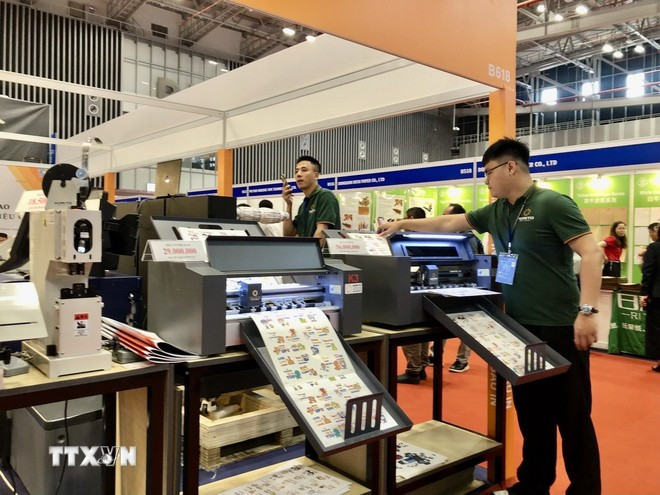Vietnam’s packaging industry goes green amidst waste crisis

Hanoi, October 13 (VNA) – Packaging waste has emerged as one of the most formidable challenges to sustainable development in Vietnam, forcing a rapid shift toward green technologies in packaging production and recycling to advance the circular economy and protect the environment.
From green packaging…
Today, green transformation and the circular economy require urgent attention in the development strategy of every nation and enterprise. As Vietnam's industrial, commercial, and service sectors continue to develop while foreign investment, production, export, and consumption activities are surging, packaging use has inevitably surged, making it one of the most common waste sources, particularly in the food and beverage (F&B) industry.
According to experts, if companies continue down the path of difficult-to-recycle packaging, overusing plastic and non-biodegradable materials, the environmental damage from packaging waste will become uncontrollable. Manufacturers and importers need to strengthen their efforts to collect, recycle, or process waste from the products and packaging they generate.
Nguyen Thanh Yen, an official from the Ministry of Agriculture and Environment, said that the Extended Producer Responsibility (EPR) policy, a modern environmental management tool that ties manufacturers and importers to the life cycle of their packaging, is being implemented nationwide.
Under new regulations taking effect in 2025, packaging must meet mandatory recycling rates. Companies must declare and report data through the national EPR electronic system and will soon be able to choose between self-recycling and contributing financially to the Environmental Protection Fund, or combining both approaches.
EPR represents more than mere compliance, he said, stating it offers a strategic lens for companies to reshape packaging design, transform their perspective on waste, and build an ecosystem with more sustainable value.
At Saigon Beer-Alcohol-Beverage Corporation (SABECO), which currently operates 25 breweries, 11 commercial companies, and maintains a presence at over 200,000 retail points nationwide, the sustainable development strategy and comprehensive innovation process begin with packaging.
Deputy General Director of the firm, Larry Lee, said that all of SABECO’s primary and secondary packaging is reusable or recyclable.
The company has reduced the thickness of aluminium can lids from 0.245 mm to 0.240 mm, resulting in a 15% reduction in material use, saving energy during transport and lowering emissions. It also applies closed-loop recycling models for glass bottles, aluminium cans, and paper packaging, aiming for 100% circular packaging by 2040.
The message of packaging recycling has expanded across multiple sectors, including textiles and footwear. Many enterprises, particularly in the mid-market segment, are launching recycled and environmentally friendly designs, strengthening product sorting, reuse, and recycling.
Garment 10 Corporation now uses paper and PET packaging with shorter degradation times instead of conventional PE plastics. Biti’s, the Vietnamese footwear brand, has simplified its packaging design to reduce single-use plastics, gradually replacing plastic bags with recycled paper or reusable fabric bags at its stores and distribution centres.
…to the greening packaging industry
Green packaging represents one of the first steps in the transition to green production for many enterprises, industries, and manufacturing sectors. The printing and packaging industry plays a leading role in green transformation, helping create environmentally friendly packaging products such as biodegradable bags, cloth bags, recycled paper boxes, and plastic containers.
Vo Hong Son, Head of the Ministry of Industry and Trade’s Representative Office in the central and southern regions, said that the printing and packaging industries have an important role in the supply chain, not only helping improve the competitive edge of products, but also promoting sustainable development progress.
Green technology in packaging production, particularly within high-consumption industries like F&B, presents vast opportunities for Vietnamese businesses to enhance brand reputation, attract green investment, and gain global competitiveness through “green certification.” However, many firms still face challenges in meeting EPR obligations and navigating complex legal frameworks.
Bui Le Thanh Khiet, a researcher at the Institute for Circular Economy Development, suggested stronger coordination among the State, enterprises, and recyclers, and the establishment of industry-specific or regional EPR councils. He emphasised the need to link value chains across regions, enterprises, and localities and offer incentives for green material innovation and financing, while raising public awareness of green products and green packaging./.





